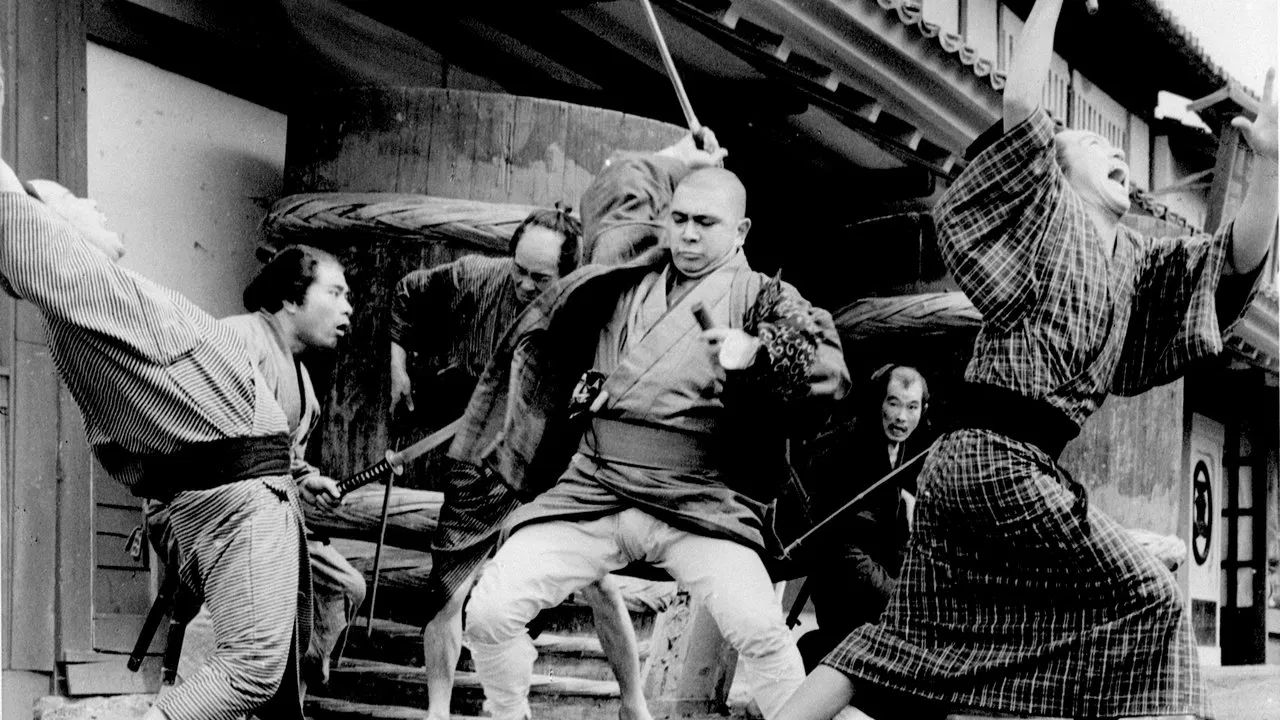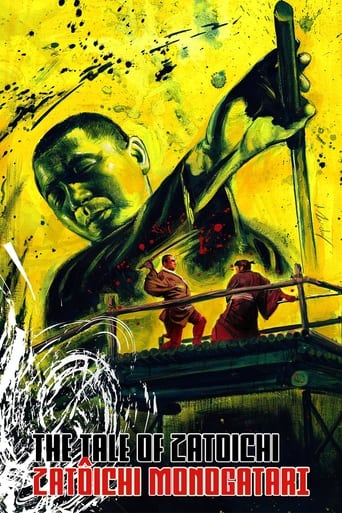

From 1962 until 1989, 26 film series and a 100 Japanese television series, some in black and white, were produced.Similar themes run through the stories yet each seems refreshingly dramatized. The later movies began to use special effects (blood) rather more seriously during sword fights - something I personally think was unauthentic and therefore, unconvincing. But, I still love the stories of the fictional character, Zatoichi.Subtitles for us who do not understand Japanese is helpful but sometimes simplistic, and often get in the way of appreciating visual story nuance and acting. The solution I could not avoid is to watch the films as often as needed to later watch with minimal or no subtitle help. This is recommended.So, simplistic subtitles is a good thing because as you watch again, virtually ignoring the easy English, your mind easily sophisticates nuance, subtext, very subtle humor, and your eye can take in the vistas of the Japanese island, the modes of dress, and the differences between classes of people which are story-driving themes.The culture of the era is easily understood because, for example, women walk like 21st century women models walk: toe first and then foot in front of next foot. However, the action is observed in a way that causes one to think it a cultural standard of the Edo era and not of this century.Every detail is authentic including the desired sharpness and blink-of-eye swiftness of sword blade that cuts so clean and fast, there is no blood residue on the blade. So when you see a scene and think, "Aw; there's no blood on the blade," with some exceptions, that's how sharp an Edo era swordsman kept the blade – life and death depended on its reliable swift surprise. And so, that is why the use of special effects blood is not authentic. The only exception known to me is when battles lasted for hours because the blade against flesh and bone would dull allowing blood and residue to adhere, somewhat, to the blade. Sharpness of blade was as culturally significant as the mode of a woman's walk.Returning to benefits of repetition, I've discovered there seem to always be, as part of the story's spine, small but integral roles for children, animals, and music which reveal characters' character, mores, and preferences. Subtle themes transition viewers to subtle/not so subtle humor and events that rally reasons why swordsmen attack Zatoichi.Zatoichi is a lone Hero living during the Japanese Edo period of 1630 until 1868. Am surmising Zatoichi roamed Japan during the 1820s, 30s, or 40s. This is based on historical accuracies of the films' well-established inns and places to eat along well-marked roads walked by many of the characters behind which is set beautiful Japanese landscapes.The roadways were vital for communication, to farmers, and others getting goods to markets; roadway paths provided the same purpose as America's Interstate System. The Japanese system included wooden directional sign posts firmly positioned into the ground. Though some directions and names were painted, important city and village directions were carved into the wooden posts.During the Edo period, politics and peasants were at extreme opposing ends of the spectrums of power and money which always flowed to political coffers by way of taxation, over-taxation, graft, theft, gambling, and debauchery.The vacuum in the middle created "middle men" who became nationally known as Yakusa: organized criminals who skimmed people's wages, taxes, anything, and took advantage of those who could not defend against their Samurai skills.Once honorable, but now without a master, they were in need of employment, shelter, and food. Political stability caused changes such that, Samurai, instrumental in stabilizing Japan, were now not needed.Most were laid off and were known as Ronin. Many became unsavory types who joined or formed a Yakusa. Many held long, lingering anger because of losing the high social status of Samurai.They were no longer able to live as Samurai or honorable men. Having lost honorable employment, shelter, food, and the brotherhood of honor, they felt unfairly treated and took resent on people unable to resist. At least now, money was available, they were able to eat and sleep somewhere, and serve a Yakusa Boss.They angrily and unhappily survived the loss of social stature. They began to survive eating their insides out with hatred and jealousy toward anyone better than they, or anyone whom they perceived as acting or even thinking were better than they. Why they did this: they only knew weaponry, martial arts, and war fighting. Their knowledge was more an instinct to survive than it was a will to live. They knew nothing of kindness except through their small window of the Samurai Code which they hypocritically enforced on people who lived as farmers. Once many were honorable Samurai, then Ronin, and now, thugs.Enter Zatoichi, living amongst the anguish of people in the middle who, lose their lively hoods, lives, happiness, and hopes to antagonistic, evil men.Zatoichi is blind. An exquisite swordsman. Honorable. Gambler. Traveling masseuse. Regrets his necessary Yakusa relationships but finds hospitality from a few Yakusa Bosses who are also honorable.He dreams of a peaceful existence, means no harm to anyone, is not mean spirited, is often set upon by rivals who seek his death. He is brought into people lives because of his compassion to help people in need of relief from oppression. He's a sucker for doing the right thing, kids, some animals make him uncertain and he likes to sing and play the shamisen, a musical instrument of 3 stings played with a large plectrum.And the sword fights! All I can say is, don't mess Zatoichi !! Enjoy these films. I don't know anywhere else to see the TV series except on YouTube; all seem excellent tales. Many are black & white; all I've seen are subtitled.
... View MoreI normally wouldn't dare rate a movie a 10. However for the first Zatoichi film (and maybe the second) I make an exception. An incredible tale of a flawed man at peace with the fact that he is a gangster. Zatoichi is forced into situation after situation where honor and compassion make us side with this blind man, not because of his handicap, but because he is doing the right thing. Filmed in black and white the action is superbly choreographed to convey the intensity of each situation without one bright red spray of blood across the screen. If you only watch one Samurai movie, make it this one. If you love it, then the first 25 of these masterpieces are coming to Blu Ray courtesy of Criterion this November.
... View MoreA tale of warring townships and two strong characters who cant help but being pawns in a horrible game of carnage. Set in rural Japan in feudal times the setting is beautiful.Too bad the camera works don't quite follow up. The scope is 70mm (or close to it), but I could settle with less if the cameraman (I suspect they didn't have one) didn't cut off the heads all the time. The use of zoom-lens sometimes works and sometimes don't. One time zooming in on Tane-san for instance was very dramatic. Intense was also the battle scenes. Very good.Zatoichi is a good character and the actor playing him is fitting. The story is good and makes for an intriguing film despite some flaws. In all respects I think its inferior to Sanjuro though.This is my first Zatoichi and I will check out other entries in the series for sure (at least the Kitano "Zatoichi" from 2003 is easy to get hold on).
... View MoreHere's to you Howard! cheers! Action 'Kung Fu' move of pops generation. Early 60's when movies were in Black and White like everything else in those days. So no, it's not the action skills we all grew to lurrve in the 70's latenight big screens on 42nd Street but for posterity you must check it.On one level it's very very true to Caribbean Shanty stock like you and me. My man, Ichi is just like the Sticksman old folk would tell me about. He is not lowlife, just normal country boy planting corn or massage or just getting by. But he has a gift of kicking ass, just like the Sticksman.Now imagine you just getting by day to day with your little handicap (you blind or have a limp) and other people see you have a gift, with weapons. Everyone is going to want you to fight for them, conquer and consolidate. Do you become Gun/Sword/Stick for hire? Do you walk away? Do you go 'Yanky on them' and set YOURSELF up as the Man in the Village?watch the movie then let's sit down and chat these question out....it's a real Historical drama to many of us from the Caribbean. - hey you can guess which option and route my dad took.Stcy
... View More